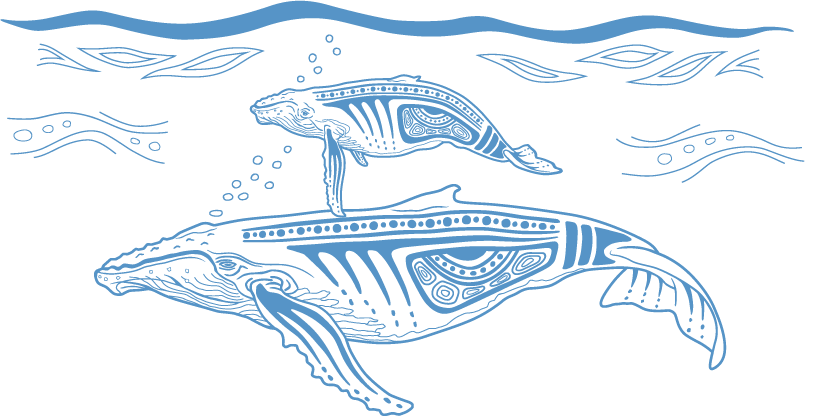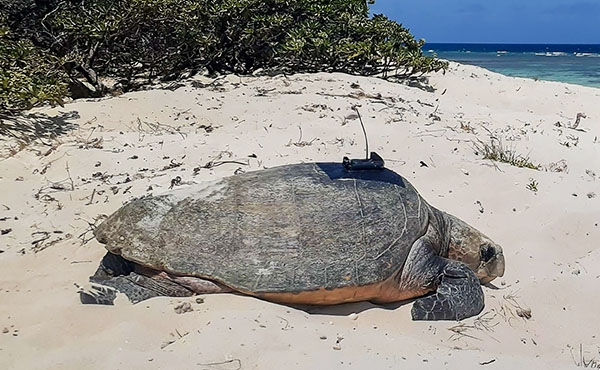Commercial marine tourism is the largest Reef-dependent industry in the Region (Figure 8.1: the system’s identity). It supports the resilience of social heritage values through providing access to the Reef, livelihoods for community, connection to nature, and opportunities for stewardship and education (Figure 8.1: system’s functions and processes, and values). In the 2015–16 financial year, before the COVID-19 pandemic, commercial marine tourism contributed an estimated $5.7 billion to the Australian economy and provided 38,000 full-time equivalent Reef-dependent jobs1324 (Figure 8.1: system’s structure and value).
The closure of the Australian and Queensland borders during the COVID-19 pandemic was devastating to the Reef tourism industry, particularly in 2020 and 2021 (Figure 8.1: disturbance [to the system]). Tourism numbers began to recover after travel restrictions were eased in February 2022, but they are yet to return to pre-pandemic levels. Tourism operators are still suffering from loss of customers and income (Figure 8.1: system’s structure). However, impacts varied depending on the type of business and location. The pandemic and the post-pandemic geopolitical situation have resulted in flow-on negative effects for Reef tourism operators, including staff shortages, regional housing shortages, loss of supply chain services and general stress and mental health issues 2144 (Figure 8.1: disturbances, feedback processes and system’s values).
Management
The Australian and Queensland governments responded swiftly to ease the financial crisis in the Reef tourism industry at the onset of the COVID-19 pandemic. In addition to the national JobKeeper Payment scheme to support staff retention and livelihoods, specific Reef initiatives included a waiver of the environmental management charge for Reef tourists and marina fees for tourism operator vessels until 30 June 2023 (Figure 8.1: absorbing and/or adapting the system’s structure and functions).
In February 2021, the Reef Authority launched the Tourism Industry Activation and Reef Protection Initiative to support ongoing tourism operations when revenue was severely reduced due to COVID-19 restrictions (Figure 8.1: absorbing and/or adapting the system’s structure and functions). The Australian Government invested $3.2 million in engaging 17 tourism operators to undertake site stewardship activities at their usual tourist destinations over the course of 6 months. The program has since expanded, and it received significant additional investment in late 2022. It is now called the Tourism Reef Protection Initiative. The Reef Authority also increased its support and training for its Master Reef Guides and Eye on the Reef programs. These initiatives provide training to tourism operators to become expert Reef guides and to collect ecological data about their regular operating sites. In June 2021, the Queensland Government initiated the Great Barrier Reef Education Experience Program to subsidise school student excursions to the Reef, bringing further income to Reef tourism and providing thousands of Australian school children with a unique experience.
While nearly all tourism operators had to cut costs, many also adapted by reconfiguring their operations for the domestic market, undertaking different activities and consolidating their service offerings (Figure 8.1: absorbing and/or adapting the system’s structure and functions). As with other processes during the COVID-19 pandemic, many tourism operators became more highly digitised by managing their own bookings and cancellations through a single online source.2144 A culture of cooperation rather than competition emerged in some areas among tourism operators. For example, one tourism operator reported:
“For those that are still owner-operators, I know them quite well, and so what we did at the beginning of COVID, and we still do it today, is that we share the load. Rather than poach each other's business … we try to run the week so that we're not overlapping each other all the time, we try to spread it out a little bit, and we've been doing that now since the beginning of COVID.” 2144
Peak tourism industry bodies also adapted by fostering a collaborative culture (Figure 8.1: absorbing and/or adapting the system’s structure and functions). Many waived membership fees and provided increased support and advocacy for their members. These cooperative and collaborative measures, as processes, are positive for human wellbeing in creating connection and support in difficult times.
Evidence for recovery or decline
The amplified role of tourism operators as Reef stewards enhances the social heritage values of the Reef and contributes to the social resilience of the Reef.2145


